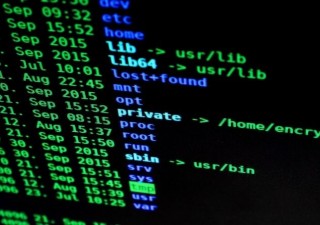Cryptocurrency and IP
28 February 2022
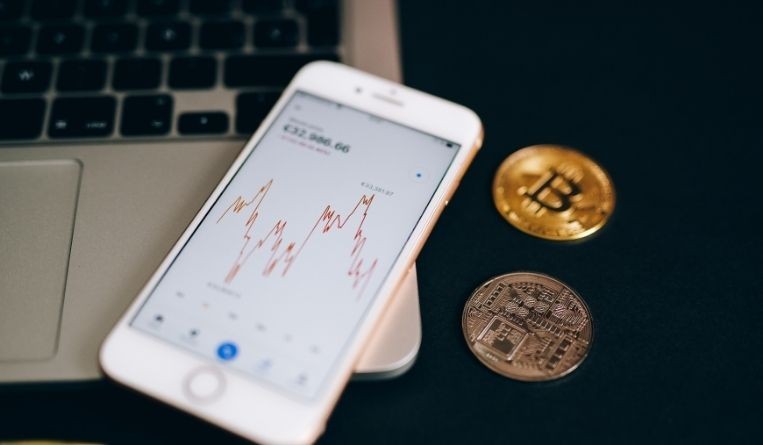
As cryptocurrencies gain traction, some of their creators are learning difficult lessons in the world of intellectual property protection. Just how can crypto be protected?
Cryptocurrency (crypto) is a type of digital currency which is unregulated and runs on the blockchain technology. Some of the more popular crypto are Bitcoin, Litecoin, Ethereum, Ethereum Classic, Dogecoin, Dash, Ripple, DESO and SafeMoon.
With the use of cryptography, transactions using crypto are secured and the transfer of assets is verified. Blockchain also helps secure crypto by preventing the emergence of counterfeits.
If this is the case, what kind of intellectual property protection is needed for cryptocurrencies?
“Although an individual coin on an established blockchain like Ethereum or Bitcoin is ‘near unhackable,’ the IP surrounding them remains vulnerable to infringement,” said John M. Mulcahy, a partner at Finnegan, Henderson, Farabow, Garrett & Dunner in Washington.
“The brand names surrounding different types of cryptocurrency and the innovative ways of creating or utilizing cryptocurrency should warrant IP protection just as other protectable trademarks and patents,” said Eugene Low, a partner at Hogan Lovells in Hong Kong.
The past decade has seen a continued increase in the number of patent applications filed before the United States Patent & Trademark Office (USPTO) involving “Bitcoin” or “cryptocurrency.” The number of applications even more than doubled in 2018 compared to 2017. Technology startups and established financial houses and information technology companies such as Bank of America, Goldman Sachs, Microsoft and Intel are filing these applications. Some of these are for technologies that make crypto transactions even more secure, to aggregate various cryptocurrencies, provide reward points for cryptocurrency transactions and other novel ways of using blockchain.
Other jurisdictions, including China, are also posting increases in the number of patents granted to cryptocurrencies.
“Considering the absence of laws and regulation at the moment, it can be said that cryptocurrency also requires IP protection since the market for cryptocurrency/non-fungible tokens (NFTs) is in billions and is growing with each passing day,” said Shashi Ojha, managing associate at RNA, Technology and IP Attorneys in Gurugram.
In India, said Ojha, there are also pending trademark applications for financial services and names like Dogecoin, Bitcoin and others.
According to William Giltinan, a shareholder and IP practice group chair at Carlton Fields in Tampa, Florida, IP protection for cryptocurrency as an invention can be loosely grouped into two categories: the design/operation of the blockchain technology itself and support technology.
As to the first category, Giltinan said: “To the extent that we want cryptocurrency to be widely adopted and used, this portion of the technology is more likely to spread if it is not protected by patents. Having it ‘open source’ makes it easier for companies and individuals to implement their own portion of the distributed ledger and adopt the cryptocurrency into their own wallets and exchanges without fear of patent infringement. It also encourages innovation in the crypto industry as it allows others to build on the blockchain designs that have come before.”
The second category, support technology, includes wallets and applications to specific problem domains. “For these, IP protection is necessary to promote investment in research and development,” Giltinan said.
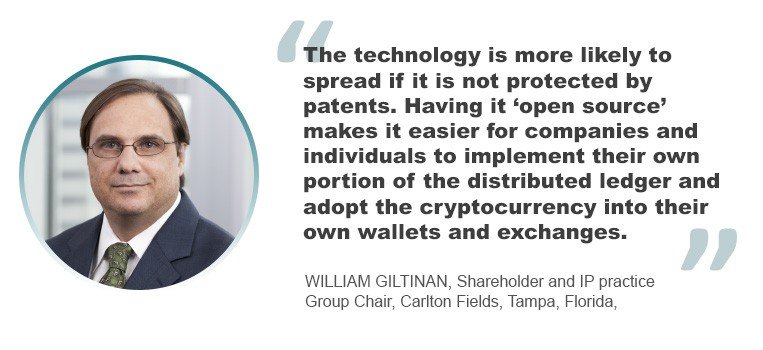
Cryptocurrency: Challenges in IP
The number of applications for patent, trademark, copyright and trade secret protection for cryptocurrency technologies is rising worldwide. But, the picture is not as rosy as it seems. As crypto is a fast-developing technology, challenges abound.
First of all, cryptocurrency is a global issue. This means, an IP owner has to file applications in multiple jurisdictions, which makes acquiring IP rights and enforcing them particularly expensive.
Many crypto projects also involve collaborative efforts without a formal company setup. This means questions as to who owns the underlying technology are bound to arise, leading to problems.
And then there is the constant threat posed by the internet. “With growing reliance on the internet, online or internet theft has also increased. Considering that the whole concept of cryptocurrency is on the internet, there are high chances of one’s asset being hacked,” Ojha said.
In the United States in particular, the protection of crypto-related inventions is an even bigger problem because of the lack of clarity surrounding their patent eligibility.
“Cryptocurrency lies at the intersection of software and finance – two areas that have historically proved difficult for the patent system to come to grips with,” said Mulcahy. “Software-implemented inventions and so-called business methods have often been found to be too abstract to be eligible for patent protection under 35 U.S.C. §101.”
However, Mulcahy added that during the past decade, the United States Supreme Court, Federal Circuit and the USPTO have tried to shed light to the question of when is a software-implemented invention patent eligible. Now, under the USPTO’s 2019 Revised Patent Subject Matter Eligibility Guidance, there appears to be a system for this, allowing the office’s 8,000-plus patent examiners to be guided as to the patent eligibility of a particular invention and apply the rules with some consistency.
“Although it’s still a difficult area, we can now predict with some certainty whether a given patent claim will ultimately be considered patent-eligible by the USPTO,” Mulcahy said.
Yet, the challenges do not stop here.
“Once a patent has been issued, however, there may be difficulties in enforcing it. As with any software patent, it can be difficult to determine whether what is going on behind the firewall infringes a patent or appropriates a trade secret,” said Mulcahy, “You can’t stop infringement that you can’t see.”
The very nature of distributed ledger technologies – that they are distributed – presents another problem.
“Each of the nodes in a given network may be operated by a different entity, in a different country. However, patents and trademarks are territorial, even if the blockchain is not. In order to prevail, you need to obtain the right IP protection in the right jurisdiction. For example, the claims of a U.S. patent should ideally be written to cover the portion of the crypto algorithm that is likely to be performed by a single US entity. If your claims cross borders or cover interactions between multiple entities, they will be more difficult to enforce,” explained Mulcahy.
He cited other challenges: the difficulty in obtaining jurisdiction over a company operating from servers overseas, the difficulty of determining (through layers of shell companies) who is ultimately responsible for marketing a coin whose name is too similar to your marquee product, the possibility of an invention’s patent eligibility being challenged during litigation and an accused infringer finding prior art overlooked by the USPTO.
“Fortunately, each of these challenges is surmountable,” said Mulcahy, “so long as you address them in a timely manner.”
One of the strengths of the US patent system is that it was built to accommodate new technologies, he says. As such, there have been and there will always be growing pains as stakeholders learn how to make the system work for them.
As to copyright, Giltinan said: “U.S. copyright protection applies to software. However, recent cases have suggested that copyright protection for software may be less broad than was previously thought.”
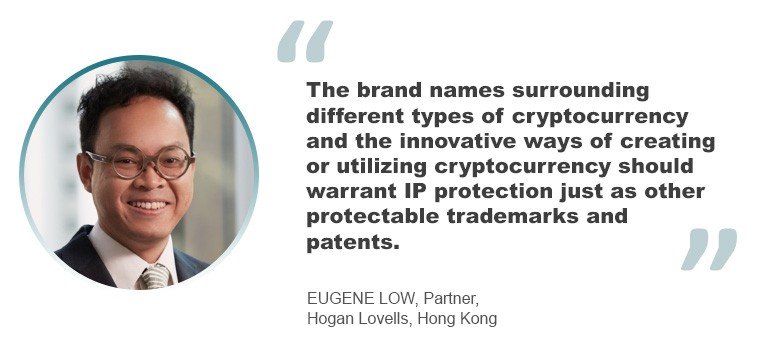
The future of IP in the crypto world
With the growing number and rising popularity of cryptocurrencies, as well as of blockchain and NFTs, the world is poised to see an uptick in innovation and IP-related activities.
“We now see more cryptocurrency-related patents being applied-for and granted,” said Low. “It will be interesting to see if there will be more IP case laws on this topic.”
“Although it’s true that there has not been much, if any, crypto patent litigation as of yet,” said Mulcahy, “that won’t be true for long. As evidenced by the increase in patent application filings and patent grants, companies are using patents to protect their crypto IP. At some point, the future of crypto will be determined in litigation.”
Stakeholders in the US are already preparing for this. In March 2017, the Chamber of Digital Commerce in Washington established the Blockchain Intellectual Property Council (BIPC) to promote innovation in the blockchain space by assisting companies with IP issues in relation to the technology. Some of the BIPC’s member companies, which includes leading stakeholders in the cryptocurrency industry, joined the Crypto Open Patent Alliance (COPA), whose members “pledge never to use their crypto-technology patents against anyone, except for defensive reasons, effectively making their patents freely available for all to use,” as stated in COPA’s website.
Meanwhile, Giltinan expects IP protection in the future to focus more on technologies that support the use of cryptocurrency, rather than blockchain technology itself.
“Fraud detection, investigation and prevention technology is likely to be an ongoing source of innovation in the field. While there are still innovations to be made on the blockchain itself, my sense is that such innovations will remain open in order to foster quicker adoption. Commercial efforts to assist in making crypto more secure, from theft and fraud, and to make access to crypto transactions easier such as ATMs, payment automation and the like, are more likely to focus on IP protection. Beyond that, the future of patent protection for software inventions remains difficult to predict. To the extent that issue is addressed, particularly in the U.S., the effect on many crypto-related inventions could be profound. At the moment, however, the future path is not clear,” Giltinan said.
“We need to look on the other fact also, which is the future of cryptocurrency,” said Ojha. “Many countries have banned crypto and many are in the process of banning it. If cryptocurrencies are legalized, then the existing IP laws also need to be amended to adapt to the change. Currently, there are 8,000 different digital currencies, and numerous NFTs are created every day, and due to lack of a single platform, it is difficult to secure their IP. Going forward, it will be difficult to safeguard rights for IP owners since crypto has no territorial borders.”
Ojha cited trademark cases in the recent past to provide a glimpse into the future.
In 2018, Telegram Messenger, which provides an encrypted message service, filed a suit against Florida-based firm Lantah, which had filed a trademark application for its crypto brand. Said mark used the word “gram,” for which Telegram already holds trademark rights. The U.S. District Court for the Northern District of California granted a motion of preliminary injunction, restricting the defendant from further using “gram” as it was similar to the plaintiff’s trademark, and thus is poised to cause confusion.
West v. McEnery had rapper and record producer Kanye West, also known as Ye, as plaintiff. The defendant (McEnery) was using “Coinye West” as a trademark for its crypto brand. The U.S. District Court for the Southern District of New York passed a default judgment in favor of West to desist the defendants from using the mark “Coinye West” for its cryptocurrency.
In India, the case of Tata Sons Private Limited v. Hakunamatata Tata Founders & Ors involved defendants Hakunamatata dealing in crypto under the name TATA coin/$TATA. In 2021, the High Court of Delhi refused to grant protection against use of the mark TATA coin/$TATA because the defendant was situated outside India and was not targeting Indian consumers directly.
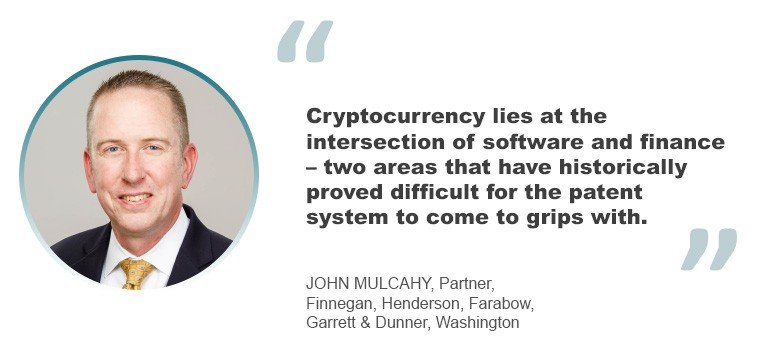
Add to these the trademark battle involving Dogecoin. Created in 2013, the cryptocurrency acquired a market capitalization of US$80 billion in early 2021. The problem was that the Colorado-based non-profit Dogecoin Foundation did not secure trademark rights over Dogecoin, thus opening the way for numerous entities to use Dogecoin as a name. Presently, at least 100 other cryptocurrencies bearing the same name have sprung up. They are not, in any way, connected with Dogecoin or the Dogecoin Foundation. One of these entities, Moon Rabbit AngoZaibatsu which is based in Cook Islands, even had its founder establish a Dogecoin Foundation of his own. The foundation, which only sought to file an application for the mark before the USPTO in August 2021, is now having problems enforcing its rights against these other cryptocurrencies.
On top of these is the possibility that Dogecoin may be regarded as a common term, like Bitcoin. If this happens, Dogecoin will not qualify for trademark protection.
“Although this string of litigation is just the beginning, there is no doubt that the amount of crypto-related trademark litigation will go up as more and more cryptocurrencies are developed and trademarked,” Ojha said.
Trade secret litigation involving software is also increasing, according to Mulcahy.
“As employees became more mobile over the past decade, we’ve seen an exponential increase in trade secret litigation involving software,” he said. “As with all software, crypto algorithms can be recreated or copied by your ex-employee’s new employer, and we should expect more and more trade secret cases involving crypto technologies.”
Certainly, a lot of things are happening in the world of cryptocurrencies, blockchain and NFTs. These developments are sure to shake the innovation and IP sectors in more ways than one, even in ways we cannot yet imagine. As Giltinan said, the path is not clear.
At least, not yet.
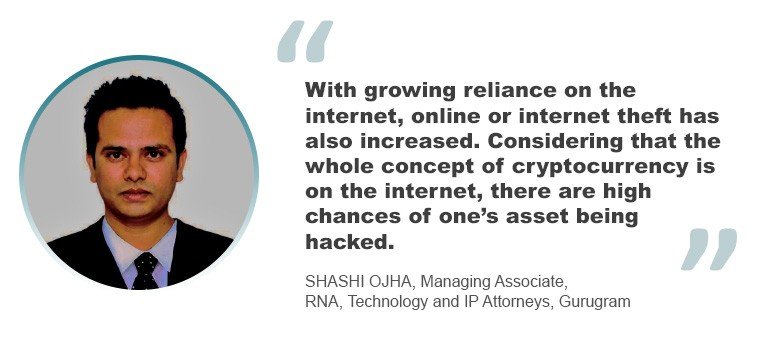
Tips for securing IP protection for cryptocurrencies
“IP laws often play catch-up with technology. Therefore, if one were to wait for IP laws tailored for cryptocurrency, they would likely be disappointed. My suggestion is to secure the basic IP protection first in order to have at least some form of protection,” says Eugene Low, a partner at Hogan Lovells in Hong Kong.
The lawyers interviewed for this story provided the following tips for seeking IP protection for cryptocurrency technologies:
- Make a choice early on between open source and proprietary protection. This is critical because of the global nature of cryptocurrency. “If proprietary protection is chosen, it is critical to ensure that IP filings are completed prior to any public disclosure,” says William Giltinan, a shareholder and IP practice group chair at Carlton Fields in Tampa, Florida. “In addition, given the rapid development in this area in recent years, it is a difficult technology to search. Often, the most relevant prior art will be outside the realm of patent filings and may be difficult to understand. It is critical, therefore, that you carefully identify the core innovation and ensure that your searcher understands the technology well enough to identify similar solutions, and also understands how to search outside the realm of patent records for this field.”
- Stake out your IP claims as early as possible. “First in time, first in right” rings true for all forms of IP protection. Companies creating new cryptocurrency technologies ideally seek for patent protection before the technology is disclosed to the public and to potential partners under an appropriate non-disclosure agreement.
It’s the same with trademarks. “Companies that fail to secure their trademarks early in the process invite imitators to step in and take advantage of any goodwill that is created by the original product. Even worse, the mark could become generic, as happened with Bitcoin,” says John M. Mulcahy, a partner at Finnegan, Henderson, Farabow, Garrett & Dunner in Washington.
- Make sure you are taking advantage of the protections that the law affords you in every category: patents, trademarks, copyright and trade secrets. Do not underutilize any of these, as each one has its uses and limits.
- Trademark selection is important. “As more consumers become involved in crypto-transactions, there is more risk that similar company names, product names, crypto-names will lead to confusion. Trademark selection is, therefore, an important issue to be considered,” explained Giltinan.
- Get cutting-edge counsel to deal with cutting-edge technologies. “Educate yourself as to the relevant legal issues and look for counsel that is pushing the envelope in these areas. Just as IP laws favor the first mover,” Mulcahy said. “They also favour those with the good sense to obtain good help when needed."
Espie Angelica A. de Leon






